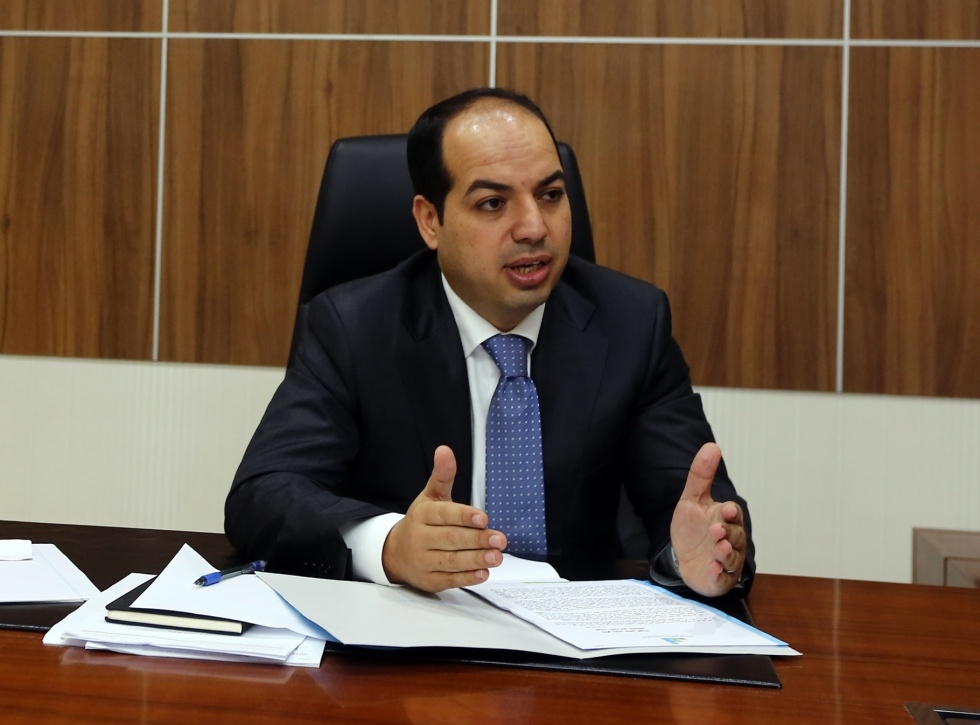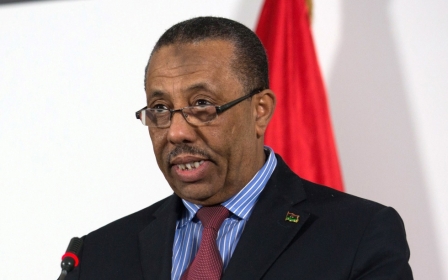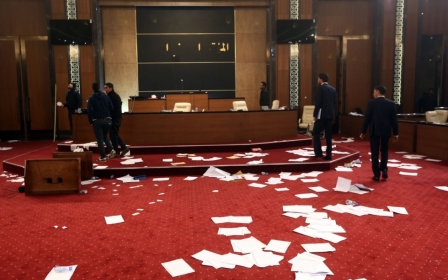Libya's Supreme Court adjourns vote on legality of Miitig's government

Libya's Supreme Court will issue a ruling next week on the legality of Ahmed Miitig's controversial election last month as interim prime minister, a court official said on Thursday afternoon, reported AFP.
The statement follows reports earlier in the day that said the court had ruled Miitig's election in May illegal. Reuters had reported that Miitig’s lawyers had immediately filed an appeal against a decree that the election be thrown out.
Several sources had told the Middle East Eye that the reports were premature and that the Supreme Court had gone into recess to consider its verdict. The initial report appears to have originated in Libya al-Ahrar, a nominally independent local TV station that some have accused of bias against Islamist groups in Libya, such as the Muslim Brotherhood.
The turbulence comes amidst a recent upswing in violence in Libya. On Thursday, the International Committee for the Red Cross (ICRC) announced that it would be ceasing operations in the country after a Swiss staff member was shot dead in the central city of Misrata.
Rogue former general, Khalifa Hafat has launched an offensive against what he calls terrorist groups, with forces loyal to him launching a series of raids on the eastern city of Benghazi in recent days.
Haftar survived an alleged assassination attempt in Benghazi on Wednesday. He was unharmed and has since appeared on Libyan television pledging to “double, double, double” the strength of bombing and intensify his forces’ assaults on militants.
Miitig vs Thani
Interim parliament the General National Congress elected Miitig on 4 May after a chaotic session. Former prime minister Abdullah al-Thani had stepped down in April following an attack on his home but has yet to hand over power pointing to the questions over Miitig’s legitimacy.
Miitig’s supporters say that at the chaotic session in May, he succeeded in getting the 120 votes needed to secure the premiership. However, his opponents insist that the businessman failed to pass this critical threshold and did not secure enough votes from the 200-member body.
While one camp states that first deputy GNC President Ezziddin al-Awami, who chaired the controversial vote, called off the vote prematurely and stopped Miitig from getting the sufficient ballots, a rival camp allied with Thani insists that Awami conducted the meeting correctly.
Despite the uncertainty, Libya analyst Mohamed Eljarh told the Middle East Eye that the Supreme Court was likely to follow the same reasoning as a lower court that declared the 4 May vote illegal last week.
Thani said on Tuesday that he would step down if the Supreme Court declared Miitig’s election legal, but there is uncertainty over whether the rift can be healed.
The significance of this ruling has also been placed in doubt.
“Even if the Supreme Court rules the vote legal illegal, people will continue to support Miitig and will merely question the court’s authority to make such a ruling,” said Eljarh. “We have already seen this in the reports that Miitig had already filed an appeal.”
“On the other hand, even if Miitig is recognised, the current situation will continue and there will be people who will not recognise his authority.”
The GNC announced last month that it would hold fresh elections on 25 June to try and end the impasse, although the move has thus far failed to alleviate tensions.
“Thani just wants to hold onto power because his and his supporters claim that Miitig did not get enough votes,” said Mohammed Abdul Malik, the European spokesperson for the Muslim Brotherhood Justice and Construction Party.
“The vice chairman left in anger and failed to complete voting. It was a stupid move on his part and the voting should have continued. Others did continue the voting and Miitig managed to get enough votes.
“The elections must be the key focal point as they are the only way out of this crisis,” Malik added, while accusing Thani supporters of trying to delay elections.
A rival parliament?
The Supreme Court controversy comes a day after a group of Libyan parliamentarians confirmed that they held meetings in the Eastern Libyan city of Beida on Wednesday, although they denied that the meet was intended to challenge Tripoli.
Reports had circulated earlier that the group of 29 General National Congress (GNC) members were intending to form a rival to the Tripoli-based GNC.
However, the group was headed by Congress First Deputy President Ezziddin Al-Awami insists that Wednesday’s gathering was “an informal consultative meeting” on the current security situation. Local civil society organisations and other stake-holders were also reportedly allowed to attend the session.
“It was not a session, it was a meeting with some civil society organisations in the east who feel that they are far removed from the power struggle that is taking place in Tripoli,” Gemenis Congressman Abdullah Gmati told local news organisation the Libya Herald from Beida.
The meeting did not include any members of the Muslim Brotherhood Justice and Construction Party and the Isalmist Wafa bloc. Several other eastern MPs also stayed clear of the meeting. Independent GNC member Ahmed Langhi told the Libya Herald that while he wished the group luck he doubted that they could make progress and also ridiculed their decision to not hold the meeting in Benghazi.
Benghazi has borne the brunt of Haftar’s offensive which has seen the Gaddafi loyalist, turn US-based exile unleash a tirade of land and air attacks on alleged terrorist targets.
Islamist group Ansar al-Sharia has been the key target of Haftar’s campaign dubbed ‘Operation Dignity’ which began on 16 May. The US has accused the group of being behind a 2012 terrorist attack on the US embassy in Benghazi, although it has not claimed responsibility for the incident in which US ambassador Chris Stevens and three other embassy officials were killed.
New MEE newsletter: Jerusalem Dispatch
Sign up to get the latest insights and analysis on Israel-Palestine, alongside Turkey Unpacked and other MEE newsletters
Middle East Eye delivers independent and unrivalled coverage and analysis of the Middle East, North Africa and beyond. To learn more about republishing this content and the associated fees, please fill out this form. More about MEE can be found here.




